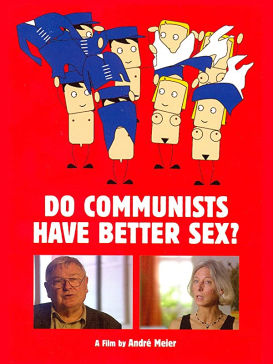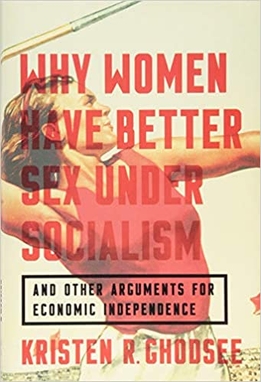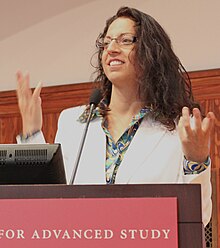Socialist feminism rose in the 1960s and 1970s as an offshoot of the feminist movement and New Left that focuses upon the interconnectivity of the patriarchy and capitalism. However, the ways in which women's private, domestic, and public roles in society has been conceptualized, or thought about, can be traced back to Mary Wollstonecraft's A Vindication of the Rights of Woman (1792) and William Thompson's utopian socialist work in the 1800s. Ideas about overcoming the patriarchy by coming together in female groups to talk about personal problems stem from Carol Hanisch. This was done in an essay in 1969 which later coined the term 'the personal is political.' This was also the time that second wave feminism started to surface which is really when socialist feminism kicked off. Socialist feminists argue that liberation can only be achieved by working to end both the economic and cultural sources of women's oppression.

Yugo-nostalgia is an emotional longing for the former country of Yugoslavia which is experienced by some people in its successor countries: the present-day Bosnia and Herzegovina, Croatia, Montenegro, North Macedonia, Serbia, Kosovo, and Slovenia. It is a political and cultural phenomenon that includes nostalgia for a time past when the splintered states were a part of one country, grief over the war that tore it apart, and a desire to again unite. Self-described Yugo-nostalgics may express grief at the failure of brotherly love, unity, and coexistence, and distress at division and nationalism, or they may express that their quality of life was better in Yugoslavia.
Maria Nikolaeva Todorova is a Bulgarian historian who is best known for her influential book, Imagining the Balkans, in which she applies Edward Said's notion of "Orientalism" to the Balkans. She is the daughter of historian and politician Nikolai Todorov, who was Speaker of the National Assembly of Bulgaria and acting President of Bulgaria in July 1990.
Daphne Berdahl was an anthropologist known for her work on Eastern Germany and Post-socialist Europe. Her work on gender and consumption as well as her writing on post-communist nostalgia has been widely cited by scholars of post-socialism.
Feminist anthropology is a four-field approach to anthropology that seeks to transform research findings, anthropological hiring practices, and the scholarly production of knowledge, using insights from feminist theory. Simultaneously, feminist anthropology challenges essentialist feminist theories developed in Europe and America. While feminists practiced cultural anthropology since its inception, it was not until the 1970s that feminist anthropology was formally recognized as a subdiscipline of anthropology. Since then, it has developed its own subsection of the American Anthropological Association – the Association for Feminist Anthropology – and its own publication, Feminist Anthropology. Their former journal Voices is now defunct.

Mihaela Miroiu is a Romanian political theorist and feminist philosopher, the most prominent activist for women's rights and a very well known activist for Roma rights and, more generally, for the rights of minorities. She is currently a professor of Political science at the Faculty of Political Science, National University of Political Studies and Public Administration, Bucharest.
The Heldt Prize is a literary award from the Association for Women in Slavic Studies named in honor of Barbara Heldt. The award has been given variously in the following categories:

Major William Frank Thompson was a British officer who acted as a liaison between the British Army and the Bulgarian communist partisans during the Second World War.

Women in Bulgaria refers to women who live in and are from Bulgaria. Women's position in Bulgarian society has been influenced by a variety of cultures and ideologies, including the Byzantine and Ottoman cultures, Eastern Orthodox Christianity, communist ideology, and contemporary globalized Western values.
Postsocialism is the academic study of states after the fall or decline of socialism, especially in Eastern Europe and Asia. The "socialism" in postsocialism is not based on a Marxist conception of socialism but rather, especially in the Eastern European context, on the idea of "actually existing socialism". Scholars of postsocialist states maintain that, even if the political and economic systems in place did not adhere to orthodox Marxist ideas of "socialism", these systems were real and had real effects on cultures, society, and individuals' subjectivities. Scholars of postsocialism often draw from other theoretical frameworks like postcolonialism and focus especially on the evolution of labor relations, gender roles, and ethnic and religious political affiliations. The idea of postsocialism has also been criticized, however, for placing so much emphasis on the impact of socialism while the term socialism remains difficult to define, especially if extended beyond Eastern Europe.
Anti anti-communism is opposition to anti-communism as applied in the Cold War. The term was first coined by Clifford Geertz, an American anthropologist at the Institute for Advanced Study, who defined it as being applied in "the cold war days" by "those who ... regarded the [Red] Menace as the primary fact of contemporary political life" to "[t]hose of us who strenuously opposed [that] obsession, as we saw it ... with the insinuation – wildly incorrect in the vast majority of cases – that, by the law of the double negative, we had some secret affection for the Soviet Union." Stated more simply by Kristen Ghodsee and Scott Sehon, "the anthropologist Clifford Geertz wrote that you could be 'anti anti-communism' without being in favour of communism."

Communist nostalgia, also called communism nostalgia or socialist nostalgia, is the nostalgia in various post-communist states of Central and Eastern Europe and Russia for the prior communist states.

Elena Lagadinova was a Bulgarian agronomist, genetic engineer, and politician.

Changes in gender roles in Central and Eastern Europe after the fall of Communism have been an object of historical and sociological study.
Krassimira Daskalova is a Bulgarian academic and pioneer in gender studies. She served as editor of L'Homme: European Journal of Feminist History from 2003 to 2011 and is co-editor of Aspasia since 2007. Between 2005 and 2010 she was president of the International Federation for Research in Women's History.

Do Communists Have Better Sex? is a 2006 German documentary film directed by André Meier. It compares the sexuality manifested by Germans during the period being divided into a Western and an Eastern part. The hypothesis manifested by scholars, interviews and footage is that sex was more free and women had more sexual pleasure in East Germany. The film discusses the possible reasons, considering the differences between the ideology and practical politics of a capitalist and a self-proclaimed communist regime.
Monica Nanyangwe Chintu was a Zambian politician, one of Zambia's first female politicians.

Why Women Have Better Sex Under Socialism is a 2018 book by anthropologist Kristen Ghodsee.
The Committee of the Bulgarian Women's Movement (CBWM) (1968–1990) was a government-affiliated organization in Bulgaria that aimed to improve women's participation in the labor force, decrease the declining birth rate, and promote gender equality during the Bulgarian socialist era. It accomplished these goals by advocating for women's rights, redefining gender roles, and securing state support for women's issues. Notable accomplishments include maternity leave and abortion rights and a program of social engineering to encourage men to take a more active role in child-rearing and homemaking activities. The CBWM played a prominent role in securing development aid for struggling economies in Africa and trained female leaders in Bulgaria to help feminist activists from Zambia. The committee has been recently recognized by scholars for its acute impacts of women's rights at the international level, with many progressive policies emerging directly from the committee's initiatives and influences. The CBWM was dissolved in 1990 after the fall of communism in Bulgaria.
Vlasta is a weekly women's magazine which has been in circulation since 1947. The magazine is headquartered in Prague, the Czech Republic. Its title is a reference to a female warrior from an Old Czech legend. It was the most popular publication of the Communist era in the country.










